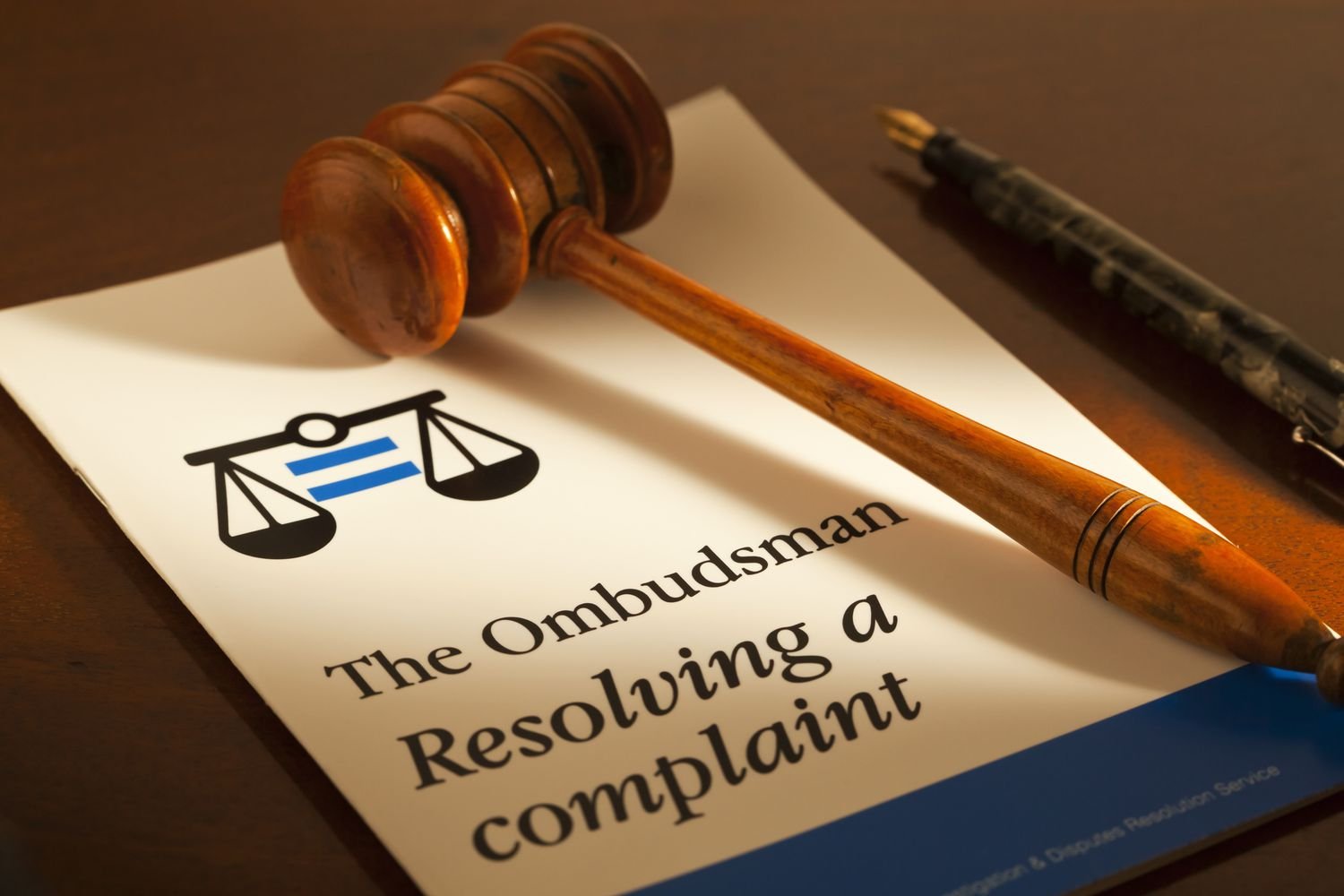What Is an Ombudsman?

Stocknshares / Getty Images
:max_bytes(150000):strip_icc():format(jpeg)/GettyImages-185000712-67b3917172444c64ab20f6f0b17e5fd7.jpg)
An ombudsman is a neutral party appointed to impartially investigate complaints, usually lodged by private citizens, against businesses, financial institutions, universities, or government departments, and attempt to equitably resolve the conflicts or concerns raised, either by mediation or by making recommendations. Ombudsmen can be found in governments, industries, businesses, schools, and other institutions.
Key Takeaways: Ombudsman
- An ombudsman is a neutral person who investigates complaints leveled against the government, businesses, and other organizations.
- Ombudsmen also serve as vital sources of information about policies and procedures.
- Depending on the jurisdiction, an ombudsman’s decision may or may not be legally binding but typically carry considerable weight.
- Members of the U.S. Congress serve as ombudsmen in their oversight capacity over federal agencies and employ staff specifically dedicated to legal compliance enforcement and investigations of maladministration on behalf of constituents.
- The three characteristics of an effective ombudsman are independence, impartiality, and confidentiality.
Function of Ombudsmen
The word “Ombudsman” evolved from a Swedish word meaning “the legal representative.” The modern meaning of the term emerged when the Swedish Parliament appointed an ombudsman in 1809 as “the official investigator of citizen complaints” to safeguard the rights of citizens through the establishment of a supervisory agency independent of the executive branch. This person was acknowledged as a “person of legal capabilities and superior virtue.”
The International Ombudsman Association has stated that, based upon its Scandinavian roots, the word ombudsman is gender-neutral in origin, as the ‘man’ suffix itself is gender-neutral in the Swedish language.
Today, an ombudsman is an official representative appointed by the government or an association to investigate accusations made by citizens against government agencies, businesses, financial institutions, or other public entities, while attempting to impartially resolve the issues involved either through conciliation or judgments based on the doctrines of procedural justice. Depending on the jurisdiction, an ombudsman’s decision may or may not be legally binding. However, even if not binding, the decision typically carries considerable weight. While ombudsmen are usually publicly appointed, they typically have a large degree of independence and autonomy in fulfilling their function. This enables them to act fairly and impartially to all parties involved.
Dispute resolution, agreement and legally resolve problems concept.
Tumsasedgars / Getty Images
Some ombudsmen have full authority to investigate and resolve issues, while some have limited capacity only to investigate and provide suggested resolutions to a governing authority or the institution subject to the complaint. Unofficial ombudsmen may be appointed by, or even work for, corporations such as utility suppliers, newspapers non-governmental organizations (NGOs), or professional regulatory bodies. In some countries, an inspector general, citizen advocate, or other official appointed by the legislature may have duties similar to those of a national ombudsman. Ombudsmen appointed in state and local governments are typically educated and experienced in one or more areas of public administration.
An ombudsman’s mandate may extend over only a specific sector of society. For example, a children’s ombudsman may be tasked with protecting the rights of a nation’s young people. In highly multilingual nations, such as Belgium, the various linguistic and regional ethnic communities may be assigned their own ombudsmen. In the United States, members of Congress serve as ombudsmen at the national level, representing the interests of their constituents and maintaining staff tasked with advocating for constituents faced with administrative difficulties, especially those caused by errors, abuse of authority, or willful wrongdoing. Where corruption is found, ombudsmen can investigate, expose, and help correct illegal behaviors. Ombudsmen help prevent governments from abusing their power, such as exerting unrestrained control over their citizens. They also help restore confidence in the system and its ability to fairly address issues.
Ombudsmen appointed in state and local governments are typically educated and experienced in one or more areas of public administration.
In addition to investigating and providing resolutions, ombudsmen serve as vital sources of information about policies and procedures. Serving as unbiased mediators, they can promote communication between parties and clarify issues that stand in the way of progress.
Characteristics of an Ombudsman
According to several resolutions adopted by the American Bar Association and accepted by the various ombudsmen’s associations, there are three characteristics that an ombudsman must display to work effectively: independence, impartiality in conducting inquiries and investigations, and confidentiality.
Independence
Independence is the foundation for constructing an ombudsman office. Part of the rationale for establishing and supporting an ombudsman is to counter constituents’ fears of retaliation for bringing forward issues. Similarly, ombudsmen have to be able to carry out their duties without fear that as a result of their work, their office, position, or resources would suffer.
Impartiality
If independence is the foundation of an ombudsman’s office, impartiality is the architectural entrance that allows individuals to visit the ombudsman. Unlike lawyers, ombudsmen are impartial, except in cases where they advocate for the rights of others. While some are familiar with or have legal training, they cannot provide legal advice. In investigations or inquiries, the ombudsman must act without initial bias or conflicts of interest. Impartiality does not, however, mean that an ombudsman cannot develop an interest in policy change or act in an advocacy role as appropriate.
As the name suggests, “advocate ombudsmen” advocate for people who have filed grievances. Present in the private and government sectors, advocate ombudsmen are often found in organizations such as long-term care facilities or agencies, organizations that work with juvenile offenders, the underserved, and those who cannot advocate for themselves.
Confidentiality
Confidentiality is the door that shields sources’ identities and communications with the ombudsman, a barrier that separates the ombudsman from other offices receiving complaints but maintaining closer ties with the policy or practice of the entity. Confidentiality “promotes disclosure from reluctant complainants, elicits candid discussions by all parties, and provides an increased level of protection against retaliation to or by any party.”
The most important skills of an effective ombudsman include active listening, communicating successfully with a diverse range of people, remaining nonjudgmental, having the courage to speak up and address problems at higher levels within an organization or government agency, problem-solving and analytical ability, and conflict resolution skills. Specific career background or academic degree is less important than acquiring and demonstrating these skills.
Government Ombudsmen
Operating within many federal and state government agencies, ombudsmen serve as persons to whom people can go for assistance with navigating the programs or policies of the agency, and when necessary, help resolve problems from a neutral standpoint.
Government ombudsmen often have the power to request relevant documents, subpoena and interview individuals, and order legal investigations if necessary. When agreed to by the party requesting assistance, rulings issued by ombudsmen are legally binding.
Created in 1968, the Administrative Conference of the United States (ACUS) is an independent federal agency within the executive branch with a mission of identifying ways to improve the procedures by which federal agencies protect the public interest and determine the rights, privileges, and obligations of private individuals. As part of this mission, the ACUS has consistently recommended that the president and Congress create and fund an effective ombudsman in those agencies that have “significant interaction” with the public.
With trust in government declining, governments are increasingly designing and implementing open government strategies and initiatives which emphasize citizens and their well-being. As institutions that traditionally interact closely with citizens, acting as mediators with the public administration, ombudsmen are key actors in the open government reform process.
To this end, ombudsmen investigate citizens’ grievances about administrative acts or failures to act and, in suitable cases, criticize or make recommendations concerning future official conduct. After investigating a case, the ombudsman typically issues a report with recommendations addressing problems or future improvements deemed to be desirable. In cases involving government agencies, the ombudsman may deal with complaints arising from administrative failures such as abusive or indifferent treatment, tardiness, and lack of responsiveness.
To succeed in this role, an ombudsman must have influence with, and the confidence of, agency leaders, be independent and be able to conduct substantive investigations into a complaint without being deterred by the agency staff whose work is being examined.
The experiences of several federal agencies show an effective ombudsman can materially improve citizen satisfaction with the workings of the government, and, in the process, increase the disposition toward voluntary compliance and cooperation with the government, reduce the occasions for litigation, and provide agency decision makers with the information needed to identify and treat problems. Agencies currently employing an ombudsman with success in various programs include the Internal Revenue Service (IRS} and the Small Business Administration (SBA).
SBA
Established by Congress in 1966, the Small Business Administration’s Office of the National Ombudsman assists small businesses, small government entities, and small nonprofits when they are subject to excessive enforcement by a federal agency. Excessive enforcement may include repetitive audits or investigations, excessive fines, penalties, threats, retaliation, or other unfair enforcement action.
Functioning as an impartial liaison, SBA ombudsmen are tasked with referring complaints and comments submitted by small businesses to the appropriate federal agencies for high-level fairness review and working across the federal government to address those concerns to help small businesses.
Annually, the SBA’s Office of the National Ombudsman rates applicable federal agencies using based on criteria such as their timeliness and quality of responses to complaint investigations.
IRS
The Taxpayer Advocate Service (TAS) is an independent ombudsman organization working within the Internal Revenue Service to assist taxpayers in being treated fairly and in knowing and understanding their rights.
Along with helping taxpayers resolve problems with the IRS, and recommending changes that will prevent the problems, the TAS protects taxpayers’ rights under the Taxpayer Bill of Rights:
- The right to be informed
- The right to quality service
- The right to pay no more than the correct amount of taxes
- The right to challenge the IRS’s position and be heard
- The right to appeal an IRS decision in an independent forum
- The right to finality
- The right to privacy
- The right to confidentiality
- The right to retain representation
- The right to a fair and just tax system
The Taxpayer Advocate Service ombudsmen work free of charge by helping taxpayers with individual problems and recommending “big picture” or systemic changes within the IRS or in the tax laws.
Each year, the National Taxpayer Advocate presents a report to Congress identifying at least 10 of the most serious problems facing taxpayers. In recent years, the key issues in the report have included tax-related identity theft and fraud on the part of certain tax return preparers.
As an example of a state government ombudsman, the California Office of the Foster Care Ombudsman is an independent resource for reviewing issues concerning children and youth in the state’s foster care system. Services include local government complaints ombudsman and state government complaints ombudsman for foster care children and foster care parents without geographic restrictions.
Complaints can be made by foster youth, foster parents, relatives, Court Appointed Special Advocates, attorneys, social workers, and other interested parties.
The foster care Ombudsmen are empowered to investigate complaints about state and local agencies regarding foster care. The office listens to concerns, documents the complaints, gathers all relevant information, remains neutral and impartial and formulates a process for possible resolution and makes recommendations. They also offer feedback on actions and recommendations to every complaint and can provide information and referral.
Media Ombudsmen
With misinformation—incorrect or misleading information—and deliberately deceptive disinformation harming trust in government and the electoral process, the role of media ombudsmen has become increasingly important.
By receiving, investigating, and reporting on complaints about news reporting, the media ombudsman promotes accurate and transparent news reporting in an environment that fosters trust with the general public. Having a media ombudsman can help media outlets avoid lengthy and costly litigation involving false reporting and claims of defamation.
Media ombudsmen work with journalists, editors, and other media professionals to investigate and respond to complaints. Often, to promote transparency in operations, they publish their response to a broader audience.
Ombudsmen in Organizations
The organizational ombudsman has been defined as, “a designated neutral who is appointed or employed by an organization to facilitate the informal resolution of concerns of employees, managers, students and, sometimes, external clients of the organization.
Organizational ombudsmen are found in all organizational settings; corporate, academic, governmental, non-governmental, and non-profit. Some may serve people both inside and outside the organization. Organizational ombudsmen respond to concerns and may report trends, systemic problems, and report organizational issues to high-level leaders and executives in a confidential manner. They do not play a formal role in setting official organizational policies, independently investigate problems brought to the organization’s attention, or represent any side in disputes.
Organizational ombudsmen provide options for people with concerns, such as whistleblowers, who seek to bring their concerns forward safely and effectively. Additionally, an organizational ombudsman offers to coach on ethics and other management issues, provides mediation to facilitate conflict resolution, helps enable safe upward feedback, and assists those who feel harassed and discriminated against.
The ombudsman listens and understands issues while remaining neutral with respect to the facts. The ombudsman does not act as a judge or decide who is right or wrong. As a critical step in developing options for resolution, the ombudsman listens to understand the issue from the perspective of the individual.
The ombudsman may refer individuals to one or more formal organizational resources that can potentially resolve the issue. When an individual within the organization, often a lower-level employee, is hesitant to raise a concern directly, the ombudsman can assist by helping give voice to the concern and creating an awareness of the issue among appropriate decision-makers in the organization.
Some organizational ombudsmen are hired internally after fulfilling previous roles in an organization where they have exhibited the necessary skills and established a widely known reputation for integrity, confidentiality, and knowledge of organizational processes across functions. When hiring from the outside, an organization will often seek someone who has a background in conflict resolution or has established standing as an ombudsman through prior organizational or governmental experience. Ombudsmen coming from outside the organization, with no history or relationships, may be able to provide fresh perspectives and the perception of neutrality may be enhanced. Organizations might also turn to independent ombudsmen who contract their services.
Sources
- Ziegenfuss, James T. Jr. “The Ombudsman Handbook: Designing and Managing an Effective Problem-Solving Program.” McFarland & Company; (December 16, 2010); ISBN-10: 0786448962.
- Zagoria, Sam. “The Ombudsman: How Good Governments Handle Citizens’ Grievances.” Seven Locks Press; (May 1, 1988); ISBN-10: 0932020593.
- Reynolds, Della. “What’s the point of the Ombudsman?” Della Reynolds; (May 25, 2020); ISBN-10: 1999929152.
- Howard, Charles. “The Organizational Ombudsman: Origins, Roles, and Operations: A Legal Guide.” American Bar Association, ISBN-10: 1604427787.



